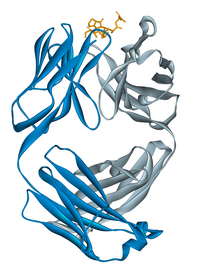
Photo from wikipedia
The anti-CD52 monoclonal antibody alemtuzumab is a highly active treatment for multiple sclerosis (MS) causing rapid depletion of B and T lymphocytes with nadir one month after last infusion. Opportunistic… Click to show full abstract
The anti-CD52 monoclonal antibody alemtuzumab is a highly active treatment for multiple sclerosis (MS) causing rapid depletion of B and T lymphocytes with nadir one month after last infusion. Opportunistic Cytomegalovirus (CMV) infections have been reported in MS patients treated with this drug. We report one patient who developed a CMV reactivation with hepatic involvement three weeks after the first cycle of alemtuzumab. This patient, promptly diagnosed and treated, achieved a complete recovery with valganciclovir. The possibility of this treatable opportunistic infection should be considered by neurologists in febrile patients with hepatic markers alteration after treatment with alemtuzumab.
Journal Title: Multiple sclerosis and related disorders
Year Published: 2018
Link to full text (if available)
Share on Social Media: Sign Up to like & get
recommendations!